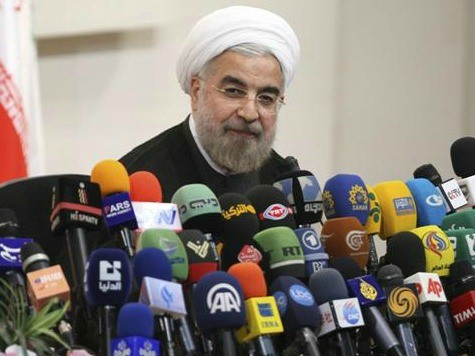President Barack Obama’s possible meeting with Iranian president Hassan Rouhani at the opening of the United Nations on Tuesday is being hailed by the mainstream media as a diplomatic breakthrough. In fact, it is a U.S. surrender, one that lends legitimacy to Iran’s brutal dictatorship, absolves it of ongoing terror and human rights abuses, and rewards it for violating binding UN Security Council resolutions on its nuclear program.
There is a reason that no American president–not even Jimmy Carter–has met with an Iranian head of state since the Islamic revolution in 1979. The Iranian government is an illegitimate one, whose illegitimacy was recently underscored by the stolen elections of 2009 and the subsequent bloody crackdown–to which Obama belatedly paid lip service after effectively shoring up the regime through a willful silence lasting nearly two weeks.
President Obama’s strategy has been to pursue diplomacy with Iran at all costs–even at the cost of protecting the regime against the democratic will of the Iranian people. Even before he was elected, President Obama campaigned in 2007 and 2008 on the foolish promise to meet with Iran’s leaders “without preconditions.” (Then, advisor Susan Rice attempted to deny that he had made such a pledge; today, presumably, she supports it.)
In pursuit of such a meeting, a newly-inaugurated President Obama did everything he could to show that he was willing to accept the regime as is–from referring to the regime by its formal self-appellation (“Islamic Republic”) to inviting Iranian officials to attend Fourth of July parties in 2009, with blood still fresh in the streets of Tehran.
Iran’s ongoing criminality, including its support for the Syrian regime, warrants further isolation; yet today Obama has wound the clock back to early 2009 as if nothing had happened.
What sustains the illusion of progress is the idea that Rouhani is a “moderate.” That false conceit, deftly created by the regime and swallowed by a credulous Western media, makes nonsense of Obama’s old claim that since Iran’s real leaders are the mullahs, meeting with Mahmoud Ahmadinejad ought to have been acceptable in theory.
The mullahs are still very much in charge, and engineered Rouhani’s rise to power in an effort to buy more time for a nuclear program that the Obama administration has already allowed to expand during years of fruitless diplomacy. They have no intention of giving up that program, and have not dropped their own precondition for talks with the U.S.–namely, that the Americans recognize Iran’s right to develop its “nuclear energy” ability.
Obama has not only embraced that right–in flagrant defiance, it must be stressed, of the UN Security Council authority that he once treated as sacrosanct–but has now granted the Iranian regime what it craved most: legitimacy. The fact that the U.S. is even willing to consider direct leader-to-leader talks is the great achievement of an Iranian nuclear program that clearly does not need to detonate a device to alter the balance of power.
A meeting with Rouhani will not forestall Iran’s nuclear program–it will, in effect, reward it. The proximate cause of Obama’s capitulation is his failure on Syria–which the White House has spun as as a success–but the deeper foundation is Obama’s commitment to appeasing America’s enemies. It is the one policy from which Obama never wavers, and that also explains his ongoing failure to deal with the post-bin Laden threat of Al Qaeda.
There is a counter-argument: that the U.S. must seize any opportunity for diplomacy with Iran, that we cannot repeat the mistake President Bill Clinton made by failing to make the most of “reformist” Mohammad Khatami’s outreach in the 1990s. The same Khatami presided over a crackdown in Iran that presaged 2009’s crushed protests.
Similarly, cheerleaders for an Obama-Rouhani summit cite the Iranian president’s somewhat contested Rosh Hashanah greeting to Jews earlier this month, forgetting that the regime has always played “real” Jews off against Israel.
Optimism about Obama’s latest appeasement trial balloon requires a selective reading of history–and reality. What Obama is signaling is not the “tough diplomacy” he once promised but a tacit surrender–one that leaves U.S. allies in the region on their own, for better or worse.

COMMENTS
Please let us know if you're having issues with commenting.